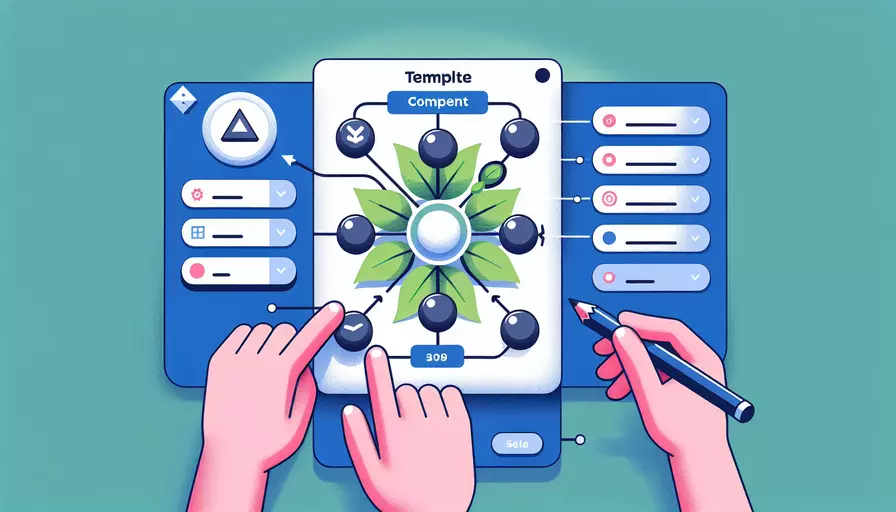
在Vue中写模板组件的方法包括1、定义组件,2、注册组件,3、使用组件。这些步骤通过Vue的单文件组件(.vue文件)或使用JavaScript定义组件并在模板中使用来实现。下面将详细描述如何在Vue中创建和使用模板组件。
一、定义组件
定义组件是创建Vue模板组件的第一步。Vue组件可以通过单文件组件(.vue文件)或者通过JavaScript对象来定义。
-
单文件组件:
在单文件组件中,通常有三个部分:
<template>、<script>和<style>。<template><div class="my-component">
<h1>{{ title }}</h1>
<p>{{ message }}</p>
</div>
</template>
<script>
export default {
name: 'MyComponent',
props: {
title: String,
message: String
}
}
</script>
<style scoped>
.my-component {
font-family: Arial, sans-serif;
}
</style>
-
JavaScript定义组件:
通过JavaScript对象定义组件,可以直接在代码中使用。
Vue.component('my-component', {props: ['title', 'message'],
template: `
<div class="my-component">
<h1>{{ title }}</h1>
<p>{{ message }}</p>
</div>
`
});
二、注册组件
注册组件是将定义好的组件在Vue实例或其他组件中进行注册,以便在模板中使用。
-
全局注册:
全局注册组件后,可以在任何Vue实例或组件中使用该组件。
Vue.component('my-component', {props: ['title', 'message'],
template: `
<div class="my-component">
<h1>{{ title }}</h1>
<p>{{ message }}</p>
</div>
`
});
-
局部注册:
局部注册组件只在注册该组件的Vue实例或父组件中使用。
import MyComponent from './MyComponent.vue';new Vue({
el: '#app',
components: {
MyComponent
},
template: '<MyComponent title="Hello" message="This is a message"/>'
});
三、使用组件
使用组件是将注册的组件在Vue模板中进行调用和渲染。
-
在模板中使用:
一旦组件被注册后,就可以在模板中像HTML标签一样使用组件。
<div id="app"><my-component title="Hello" message="This is a message"></my-component>
</div>
-
在父组件中使用:
如果组件是局部注册的,可以在父组件的模板中使用。
<template><div>
<MyComponent title="Hello" message="This is a message"/>
</div>
</template>
<script>
import MyComponent from './MyComponent.vue';
export default {
components: {
MyComponent
}
}
</script>
四、组件的通信
组件之间的通信是Vue中一个重要的概念,主要通过props和事件来实现。
-
通过props传递数据:
父组件通过props向子组件传递数据。
<template><div>
<ChildComponent :title="parentTitle" />
</div>
</template>
<script>
import ChildComponent from './ChildComponent.vue';
export default {
data() {
return {
parentTitle: 'Title from Parent'
}
},
components: {
ChildComponent
}
}
</script>
-
通过事件传递数据:
子组件通过自定义事件向父组件传递数据。
<template><div>
<button @click="sendMessage">Send Message</button>
</div>
</template>
<script>
export default {
methods: {
sendMessage() {
this.$emit('messageSent', 'Message from Child');
}
}
}
</script>
父组件监听事件并处理:
<template><div>
<ChildComponent @messageSent="handleMessage" />
</div>
</template>
<script>
import ChildComponent from './ChildComponent.vue';
export default {
methods: {
handleMessage(msg) {
console.log(msg);
}
},
components: {
ChildComponent
}
}
</script>
五、总结
在Vue中写模板组件需要定义、注册和使用组件。通过单文件组件或JavaScript对象定义组件,然后进行全局或局部注册,最后在模板中使用组件。组件之间可以通过props和事件进行通信。掌握这些基本概念和步骤,可以帮助开发者更好地组织和管理Vue项目中的组件,提高代码的可维护性和可复用性。进一步的建议是深入学习Vue的高级功能,如动态组件、插槽等,以便更灵活地构建复杂的应用。
相关问答FAQs:
1. 什么是Vue模板组件?
Vue模板组件是Vue框架中的一种组件类型,它用于封装可复用的UI元素。模板组件可以包含HTML、CSS和JavaScript代码,用于展示和交互用户界面。通过使用模板组件,您可以将界面的不同部分分解为独立的组件,使代码更加可维护和可扩展。
2. 如何创建Vue模板组件?
在Vue中,创建模板组件非常简单。首先,您需要在Vue实例中注册组件。在Vue实例的components选项中,使用Vue.component方法注册组件。例如,假设您有一个名为MyComponent的模板组件,您可以像这样注册它:
Vue.component('my-component', {
// 组件的选项和代码
})
在上述代码中,my-component是组件的名称,您可以根据需要自定义它。然后,在HTML模板中使用该组件,如下所示:
<my-component></my-component>
这将在页面上渲染MyComponent组件。
3. 如何在Vue模板组件中使用数据和方法?
在Vue模板组件中,您可以通过使用data选项来定义组件的数据。在data选项中,您可以声明需要在组件中使用的变量。例如,假设您想要在MyComponent组件中使用一个名为message的变量,您可以这样做:
Vue.component('my-component', {
data() {
return {
message: 'Hello, Vue!'
}
}
})
在组件的模板中,您可以通过使用{{}}语法来引用数据,如下所示:
<template>
<div>
{{ message }}
</div>
</template>
上述代码将在页面上渲染出Hello, Vue!。
除了数据,您还可以在模板组件中定义方法。在组件的methods选项中,您可以声明需要在组件中使用的方法。例如,假设您想要在MyComponent组件中定义一个名为greet的方法,您可以这样做:
Vue.component('my-component', {
methods: {
greet() {
console.log('Hello from MyComponent!')
}
}
})
然后,在组件的模板中,您可以通过使用@click指令来调用该方法,如下所示:
<template>
<button @click="greet">Greet</button>
</template>
上述代码将在页面上渲染一个按钮,当用户点击按钮时,将在控制台中打印出Hello from MyComponent!。
文章标题:vue如何写模板组件,发布者:不及物动词,转载请注明出处:https://worktile.com/kb/p/3655445

 微信扫一扫
微信扫一扫  支付宝扫一扫
支付宝扫一扫 